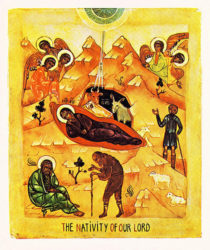Scripture

Christ Jesus . . . who, though he was in the form of God, did not count equality with God a thing to be grasped, but made himself nothing, taking the form of a servant, being born in the likeness of men. – Philippians 2:6-7
A voice cries:
“In the wilderness prepare the way of the Lord;
make straight in the desert a highway
for our God.
Every valley shall be lifted up,
and every mountain and hill
be made low;
the uneven ground shall become level,
and the rough places a plain.
And the glory of the Lord shall
be revealed,
and all flesh shall see it together,
for the mouth of the Lord has spoken.” – Isaiah 40:3-5
Reflection
The Incarnation reveals, among other things, the immense tenderness and unexpected ways of God. He who spoke the world into being decides, in order to communicate with us, to become human himself. He is the vineyard owner of his own parable who has already sent messengers in the form of prophet and cloud and who now sends his Son, his own self, that we might hear from him. What dignity he bestows on us in becoming like us and intending his words for us.
Jesus came to us incarnated, as flesh, as body, as human. And how he came surely tells us something. He came in poverty, born not in a clean and quiet bedroom, sheets laundered, candles lit, but in a barn, companioned with cows, onto a bed of hay, the place perfumed in manure. He came among scandal, his mother a young teenage girl, a virgin, and pregnant before her wedding and not by her betrothed, nor by any man. He came as we all come into the world: out of his mother’s body, covered in vernix and bound by the life cord, and announcing his arrival in the simplest of terms—a newborn’s first cry. His hometown unknown, insignificant, except that by it, he fulfills Isaiah’s prophecy. His father, a woodworker. And no one but animals and parents to bear witness to the single most extra-ordinary event in history: God becoming man, in the most defenseless of states. That is, until the angels, in their never-ending glory-to-God, reveal to shepherds—the lowliest of professions—this news, and the Holy Spirit directs the wise men by a star.
Jesus, a newborn baby, his head lolling, his eyes those infant eyes that can’t yet focus. Who, knowing this condition, would submit to it? And yet, what love a child evokes, what wonder. To think that Jesus was offering to be known by family and community, to have a personal history, to live as toddler, gangly eight-year-old, preteen. To learn craftsmanship, to read and study the Torah, to submit to learning and growing in what he eternally is: wisdom, love, beauty, goodness, and truth.
G. K. Chesterton suggested that we see the back side of the real. Paul said we see through a glass dimly lit. Robert Farrar Capon wrote, “Paradox is the only basket large enough to hold truth.” Not only does God become human; he who made humans, and made them in his image, now takes our form in order to reveal himself, his love, and his salvation to us.
Though he is God, there is no state too lowly for Jesus. God made no thoughtless steps in coming as he did. There is no way for us to say, what a good man Jesus was because of the life of luxury he led, his family, his privileges. He became human, through and through, and without worldly charms of riches, handsome appearance, prestige, or fame. We learn later that there is no suffering too great either. He would be tempted, provoked, despised, and betrayed. Behold, the “man of sorrows” and the King eternal.
What can we understand but that Jesus comes into the world for us and for us all. To reveal himself to us and invite us to know him. Nothing privileges us before God. Shepherd and wise man alike kneel before him, and the shepherd first.
Prayer
O God, who wonderfully created, and yet more wonderfully restored, the dignity of human nature: Grant that we may share the divine life of him who humbled himself to share our humanity, your Son Jesus Christ; who lives and reigns with you, in the unity of the Holy Spirit, one God, for ever and ever. Amen. – The Book of Common Prayer
Reflection
- Jesus did not come as a warrior or king, as people wanted, but in vulnerability and with sacrificial love. How does the paradox of Jesus’ arrival speak to your life now?
- Is it ever difficult for you to imagine Jesus’ humanity? Why? What does it say to you about your own humanity that Jesus chose to come as fully human?
Further Reading
Capon, Robert Farrar. The Supper of the Lamb. Modern Library, 2002. 155.
Chesteron, G.K. The Man Who Was Thursday. Feather Trail Press, 2009.
Joy Moore lives in Tennessee and works at Union University, where she manages two coffee shops and a music venue and teaches creative writing. She graduated from the University of Arkansas with a degree in English and creative writing and holds an MFA from Pacific University. Her poems have appeared in Hunger Mountain, The South Carolina Review, Lake Effect, Serving House, and Prairie Schooner, where she won a Glenna Luschei award.

Leave a Reply